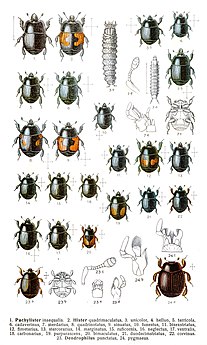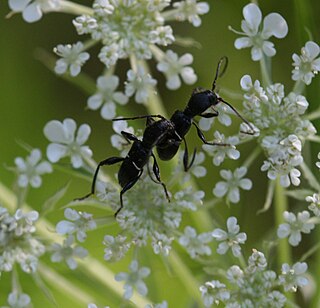| Hypocaccus dimidiatipennis | |
|---|---|
| Scientific classification | |
| Kingdom: | Animalia |
| Phylum: | Arthropoda |
| Class: | Insecta |
| Order: | Coleoptera |
| Family: | Histeridae |
| Genus: | Hypocaccus |
| Species: | H. dimidiatipennis |
| Binomial name | |
| Hypocaccus dimidiatipennis (J. E. LeConte, 1824) | |
Hypocaccus dimidiatipennis is a species of clown beetle in the family Histeridae. It is found in North America. [1] [2] [3]

Histeridae is a family of beetles commonly known as Clown beetles or Hister beetles. This very diverse group of beetles contains 3,900 species found worldwide. They can be easily identified by their shortened elytra that leaves two of the seven tergites exposed, and their elbowed antennae with clubbed ends. These predatory feeders are most active at night and will fake death if they feel threatened. This family of beetles will occupy almost any kind of niche throughout the world. Hister beetles have proved useful during forensic investigations to help in time of death estimation. Also, certain species are used in the control of livestock pests that infest dung and to control houseflies. Because they are predacious and will even eat other Hister beetles, they must be isolated when collected.



